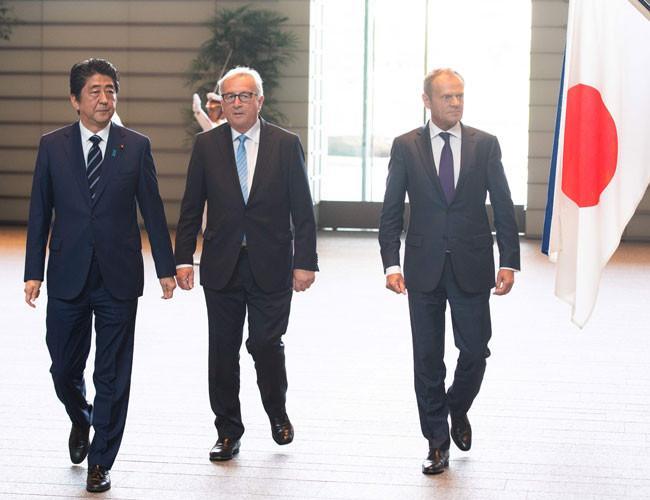
The European Union’s top officials arrive in Japan on July 17 to sign the single market’s biggest trade deal ever and present a united front as Washington upends the international trade order.
EU and Japanese officials say the deal demonstrates their commitment to lowering trade barriers even as U.S. President Donald Trump pushes his protectionist “America First” policy.
Trump has unsettled America’s allies and provoked the ire of its rivals with bombastic statements, hefty trade tariffs, and threats of a trade war.
EU Council President Donald Tusk and Commission head Jean-Claude Juncker land in Japan on July 17 after talks in Beijing, where they urged calm instead of “conflict” in international trade.
“It is the common duty of Europe and China, but also America and Russia, not to destroy (the global trade order) but to improve it, not to start trade wars which turned into hot conflicts so often in our history,” Tusk said on July 16 in Beijing.
“There is still time to prevent conflict and chaos.”
The “landmark” EU-Japan deal creates a massive economic zone and stands in stark contrast to Trump’s protectionism.
Agreed last December, the deal is “the biggest ever negotiated by the European Union,” according to Commission spokesman Margaritis Schinas.
“This agreement will create an open trade zone covering nearly a third of the world’s GDP,” he said.
The EU - the world’s biggest single market with 28 countries and 500 million people - is trying to boost alliances in the face of Trump’s protectionist administration.
The EU-Japan deal will send a “strong signal to the world” against US protectionism, EU Trade Commissioner Cecilia Malmstrom said recently.
“At a time when protectionist measures are gaining steam globally, the signing of the Japan-EU deal today will show the world once again our unwavering political will to promote free trade,” Japan’s minister for economic revitalization Toshimitsu Motegi said on July 17.
Trump’s administration has angered traditional allies like the EU and Japan by imposing trade tariffs, while rattling international markets by threatening a trade war with China.
On July 15, the U.S. president fuelled rising rancor by labelling the EU, along with Russia and China, “a foe” of the United States, and repeating his assertion that the EU has “really taken advantage of us on trade”.
EU officials and Japan will also look to present a united front against U.S. tariffs on steel and aluminum, which Tokyo has called “deplorable.”
Junichi Sugawara, a senior research officer at Mizuho Research Institute, said Trump’s protectionism had “prompted Japan and the EU to speed up negotiations on the deal.”
Japan’s Prime Minister Shinzo Abe “has good relations with Trump, but in terms of trade, Japan has sided with the EU,” he said.
“Japan and the EU will form a united front against a U.S. threat to impose tariffs on key products such as cars.”
Under the trade agreement, the EU will open its market to Japan’s auto industry, with Tokyo in return scrapping barriers to EU farming products, especially dairy.
The EU is seeking access to one of the world’s richest markets, while Japan hopes to jump-start an economy that has struggled to find solid growth.
Talks last year closed the gap on most remaining issues between the two sides, but a dispute resolution mechanism remains to be negotiated.
Abe had been scheduled to sign the deal in Brussels last week, but cancelled his trip after devastating floods that killed more than 220 people.